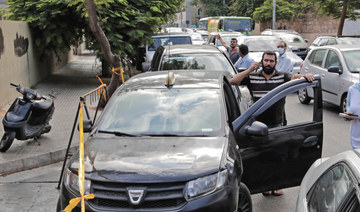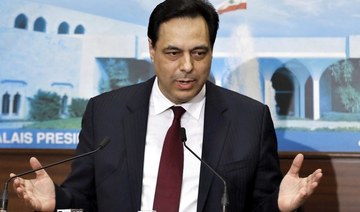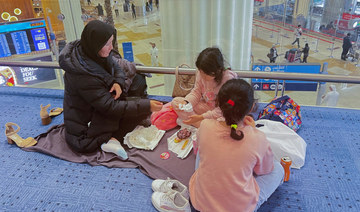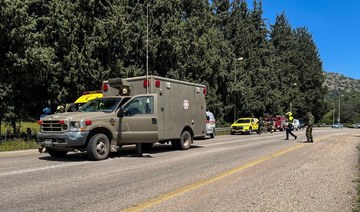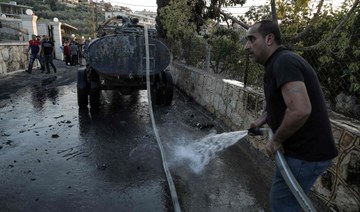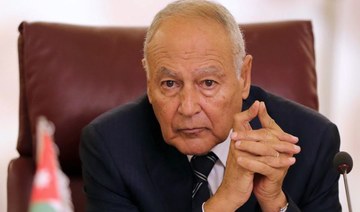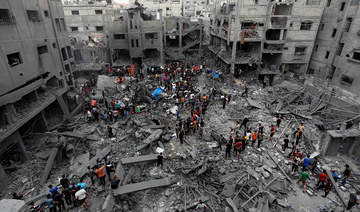BEIRUT: A trove of leaked documents confirmed that for years, Lebanon’s politicians and bankers have stowed wealth in offshore tax havens and used it to buy expensive properties.
A galling revelation for masses of newly impoverished Lebanese, caught in one of the world’s worst economic meltdowns in decades.
Some of the newly outed holders of offshore accounts belong to the same ruling elite that is being blamed for the collapse and for derailing the lives of ordinary Lebanese who have lost access to savings and now struggle to get fuel, electricity and medicine.
Bold-faced names in the leaked documents include the longtime central bank governor, a pivotal figure in the failed policies that helped trigger the financial crisis, as well as Prime Minister Najib Mikati and his predecessor.
The documents, named the “Pandora Papers,” were examined by the International Consortium of Investigative Journalists, with the first findings released on Sunday. The ICIJ report exposes the offshore secrets of wealthy elites from more than 200 countries and territories.
It was based on a review of nearly 11.9 million records obtained from 14 firms that provide services in setting up offshore firms and shell companies. Clients of such firms are often trying to hide their wealth and financial activities.
Setting up an offshore company is not illegal, but reinforces the perception that the wealthy and powerful play by different rules — a particularly upsetting notion for many Lebanese.
The papers show how members of the political class were sending wealth abroad for years, even as they urged people to deposit money in Lebanon’s banks, assuring them that it was safe, said Alia Ibrahim, a Lebanese journalist.
“We are not talking about regular citizens,” said Ibrahim, a co-founder of Daraj, a Beirut-based independent digital media platform, and one of scores of journalists across the world who worked with ICIJ on the investigation into the documents.
“These are politicians who served in public office for years, and they are partly responsible for the current crisis Lebanon is going through,” she said.
Lebanon is in the midst of what the World Bank says is one of the world’s worst economic meltdowns in the past 150 years. More than 70 percent of the population has been thrown into poverty, their savings nearly wiped out in the crisis that began in late 2019 and was in part caused by decades of corruption and mismanagement by the political class.
Hundreds of thousands of people staged nationwide protests against corruption starting in late 2019. Yet two years later the same politicians still run the country in the same way, protected by the sectarian-based system.
One of the protesters, Samir Skaff, said that the Lebanese are not surprised to be told that the political class “is made up of a bunch of thieves.”
“We have been saying that for years,” he said.
Offshore companies, though not illegal, can be used to elude taxes or hide illicitly gained money. The leaks only add further confirmation to what Lebanese have long said about their ruling class — though repeated reports of graft or illicit activity in the past have failed to bring change.
One of the 14 firms listed by ICIJ as providing offshore services is Trident Trust, with 346 Lebanese clients making up the largest group, more than double the second-place country, Britain.
One focus of the revelations is Riad Salameh, who has been Lebanon’s central bank governor for nearly 30 years.
Daraj reported that the documents showed Salameh founded a company called AMANIOR, based in the British Virgin Islands, in 2007. He is listed as its full owner and sole director, which Daraj said appeared to violate Lebanese laws forbidding the central bank governor from activity in any enterprise.
Salameh’s office told The Associated Press that the central bank governor has no comment on the documents. ICIJ quoted him as saying that he declares his assets and has complied with reporting obligations under Lebanese law.
Salameh, 70, is being investigated in Switzerland and France for potential money laundering and embezzlement. Local media reported over the past months that Salameh and his brother as well as one of his aides have been involved in illegal businesses, including money transfers abroad despite the capital controls imposed at home. Salameh had denied making such transfers.
Other documents showed that Marwan Kheireddine, chairman of Lebanon’s Al-Mawarid Bank, was involved in setting up a flurry of offshore businesses in the months just before the economic crisis hit in late 2019. In November that year, his bank and others began imposing capital controls that meant Lebanese could pull very little money out of their accounts even as the currency crashed, wrecking their savings’ value.
The Pandora Papers reveal that in 2019, Kheireddine received control of an offshore firm in the British Virgin Islands, which he then used to buy a $2 million yacht.
In January 2019, he and his brother set up four firms in Britain on the same day, all based at the same London address, and all registered as “small companies,” which Daraj said meant they are exempt from auditing. In 2020, Kheireddine bought a $9.9 million New York penthouse sold by American actress Jennifer Lawrence, Lebanese media reported at the time.
Kheireddine is a former Cabinet minister and a senior member of the Lebanese Democratic Party. He did not respond to calls and a text message by the AP.
Prime Minister Mikati, a businessman who formed a new government last month, has owned a Panama-based offshore company since the 1990s. He used it in 2008 to buy property in Monaco worth more than $10 million, Daraj reported from the documents.
The leaked documents also show that his son Maher was a director of at least two British Virgin Islands-based companies, which his father’s Monaco-based company, M1 Group, used to obtain an office in central London.
Mikati released a statement saying his family fortune was amassed prior to his involvement in politics and was “compliant with global standards” and regularly scrutinized by auditors. Contacted by the AP, Mikati’s media adviser Fares Gemayel said he had no comment.
Speaking to Daraj, Maher Mikati said it was common for people in Lebanon to use offshore companies “due to the easy process of incorporation” and denied the purpose was to evade taxes.
Mikati’s predecessor as prime minister, Hassan Diab, was a co-owner of a shell company in the British Virgin Islands, Daraj reported.
Diab’s office said in a statement Monday that he helped establish the company in 2015, but it did not do any business and he resigned from the firm and gave up his shares in 2019.
“Is the setting up of a company against the law?” the statement said.
Diab’s government resigned days after a massive Aug. 4, 2020, blast in Beirut that killed and injured hundreds and destroyed the city’s port and nearby neighborhoods. Diab was charged with intentional killings and negligence in the case. He denies any wrongdoing but has refused to be questioned by the judge leading the investigation.
As Lebanese got poorer, politicians stowed wealth abroad
https://arab.news/z5q8b
As Lebanese got poorer, politicians stowed wealth abroad
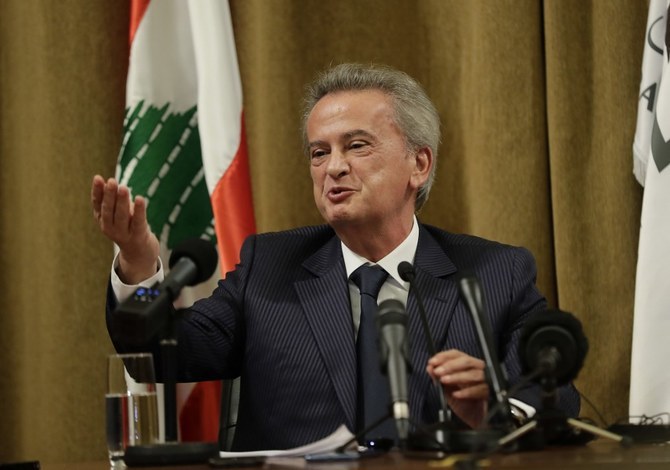
- Some of the newly outed holders of offshore accounts belong to the same ruling elite that is being blamed for the collapse
- Bold-faced names in the leaked documents include the longtime central bank governor, Riad Salameh, Prime Minister Najib Mikati and his predecessor
Gazans search for remains after deadly Rafah strike

An Israeli strike hit the home where a displaced Palestinian family was sheltering in the southern city of Rafah, relatives and neighbors told AFP as they scraped at the soil with their hands.
Al-Arja said the blast killed at least 10 people.
“We retrieved the remains of children and women, finding arms and feet. They were all torn to pieces.
“This is horrifying. It’s not normal,” he said, hauling concrete and broken olive branches from the wreckage. “The entire world is complicit.”
Soon after the war began on Oct. 7, Israel told Palestinians living in the north of Gaza to move to “safe zones” in the territory’s south, like Rafah.
But Israeli Prime Minister Benjamin Netanyahu has since vowed to invade the city, where around 1.5 million people live in shelters, more than half the territory’s population.
“How is Rafah a safe place?” said Zeyad Ayyad, a relative of the victims. He sighed as he cradled a fragment of the remains.
“I heard the bombing last night and then went back to sleep. I did not think it hit my aunt’s house.”
The search for remains was long and painful. The strike left a huge crater and children picked through the rubble while neighbors removed debris, tarpaulin, a pink top.
“We can see them under the rubble and we’re unable to retrieve them,” Al-Arja said.
“These are people who came from the north because it was said the south is safe.”
“They struck without any warning,” he said.
In a separate strike on the house in Rafah’s Al-Salam neighborhood overnight on Tuesday, rescue crews recovered the corpses of eight family members, including five children and two women, Gaza’s civil defense service said.
“An Israeli rocket hit a house of displaced people,” said resident Sami Nyrab.
“My sister’s son-in-law, her daughter, and her children were having dinner when an Israeli missile demolished their house over their heads.”
Dubai clears up after epic rains swamp glitzy city
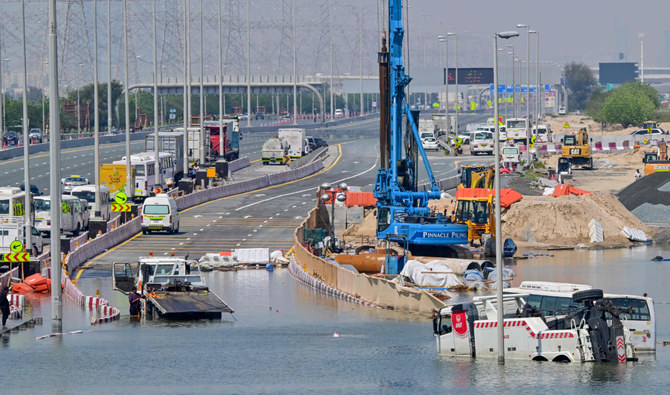
- The rains were the heaviest experienced by the UAE in the 75 years that records have been kept
DUBAI: Dubai was busy on Thursday clearing its waterlogged roads and drying out flooded homes two days after a record storm deposited a year’s worth of rainfall in a day.
Dubai International Airport, a major travel hub, struggled to clear a backlog of flights, and many roads were still flooded in the aftermath of Tuesday’s deluge.
The rains were the heaviest experienced by the UAE in the 75 years that records have been kept.
They brought much of the country to a standstill and caused significant damage.
Flooding trapped residents in traffic, offices, and homes.
Many reported leaks at their homes, while footage circulated on social media showed malls overrun with water pouring from roofs.
Traffic remained heavily disrupted.
A highway through Dubai was reduced to a single lane in one direction, while the main road connecting Dubai with Abu Dhabi was closed in the Abu Dhabi direction.
“This was like nothing else. It was like an alien invasion,” said Jonathan Richards, a Dubai resident from Britain.
“I woke up the other morning to people in kayaks, pet dogs, pet cats, and suitcases outside my house.”
Another resident, Rinku Makhecha, said the rain swamped her newly renovated house, which she moved into two weeks ago.
“My entire living room is just like ... all my furniture is floating right now,” she said.
In Dubai’s streets, some vehicles, including buses, could be seen almost entirely submerged in water.
Long queues formed at petrol stations.
Dubai Airport had not resumed normal operation after the storm flooded taxiways, forcing flight diversions, delays, and cancellations.
Dubai Airport Chief Operating Officer Majed Al Joker told Al Arabiya TV he expected Dubai International Airport to reach 60 to 70 percent capacity by the end of Thursday and full operational capacity within 24 hours.
The airport struggled to get food to stranded passengers, with nearby roads flooded and overcrowding limited access to those who had confirmed bookings.
While some roadways into hard-hit communities remain flooded, delivery services across Dubai, whose residents are used to ordering everything at the click of a mouse, slowly began returning to the streets.
Following Tuesday’s events, questions were raised about whether cloud seeding, a process that the UAE frequently conducts, could have caused the heavy rains.
A UAE government agency overseeing cloud seeding — manipulating clouds to increase rainfall — denied conducting such operations before the storm.
President Sheikh Mohammed bin Zayed Al-Nahyan said in a statement that he had ordered authorities to assess the damage and support families impacted by the storm.
Dubai’s Crown Prince Sheikh Hamdan bin Rashid Al-Maktoum said on X that the safety of citizens, residents, and visitors was the utmost priority.
“At a meeting with government officials in Dubai, we set directives to prepare comprehensive plans in response to natural crises such as the unexpected current weather conditions,” he said.
Hezbollah says 2 fighters killed in Israeli strikes
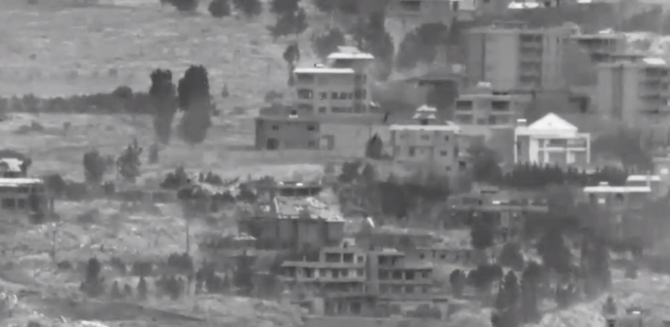
- GPS interference affecting both sides of Lebanese border, source says
BEIRUT: Two Hezbollah fighters were killed on Wednesday as Israel intensified strikes on south Lebanon following an attack by the Iran-backed group that wounded 14 Israeli soldiers.
Israel and Hezbollah have exchanged near-daily cross-border fire since Palestinian militant group Hamas attacked southern Israel on Oct. 7, triggering war in the Gaza Strip.
A security source said: “Hezbollah’s complex attack against the Israeli army in Wadi Al-Aramshe early on Wednesday, which led to the injury of 14 Israeli soldiers, including six with serious injuries, was absorbed by the Israeli side after the painful blow it directed at the party by assassinating three of its field officials.”
The Israeli army responded to the Wadi Al-Aramshe operation on Wednesday night by targeting the town of Iaat in the Bekaa Valley, 5 km from Baalbek. A drone strike hit a warehouse belonging to a member of the Al-Zein family, resulting in light wounds to one civilian.
Israel continues to jam GPS around the Lebanese southern border region, especially during military operations.
A security source said: “This interference negatively affects both the Israeli army and Hezbollah in targeting objectives.”
Hezbollah announced a series of operations since dawn on Thursday, targeting Israeli military sites opposite the Lebanese border.
The group targeted an Israeli force attempting to withdraw a military vehicle that was targeted on Wednesday at Metula, opposite the Lebanese town of Kfarkela.
At dawn, Israeli soldiers in Al-Malikiyah, opposite the Lebanese town of Aitaroun, were targeted by Hezbollah using missiles.
The group also targeted Israeli soldiers in Al-Marj.
“After careful monitoring and anticipation of the enemy’s movement at Al-Marj … they were targeted with missile weapons and suffered a direct hit; some died while others were injured,” the group said in a statement.
Hezbollah attacked Israeli soldiers using missiles in the Hanita forest, opposite the Lebanese town of Alma Al-Shaab.
On Thursday, the party mourned two members killed in Wednesday night’s shelling of Kfarkela. Mohammed Jamil Al-Shami from Kfarkela and Ali Ahmed Hamadeh from Doueir were killed in the Israeli operation.
The Israeli army targeted Lebanese towns with heavy shelling until dawn on Thursday. The town of Khiam was a priority target; correspondents in the area counted seven strikes and 128 artillery and phosphorous shells impacting between 8 p.m. and 4 a.m.
A young man from Habboush, Ahmed Hassan Al-Ahmed, was killed in the shelling and mourned by residents of his town.
Jets struck Hezbollah targets in Khiam, including infrastructure and two military buildings, the Israeli army said.
Israeli drones targeted a house on the outskirts of Markaba and in Blida on Thursday, with casualties reported.
The Israeli army also targeted Kfarkela with two missiles from a drone, and with artillery and phosphorous shells. From Metula opposite the border, Israeli soldiers combed the town with heavy machine guns.
The outskirts of Dhayra, Al-Bustan and Aita Al-Shaab were hit by gunfire from the Israeli position in Birkat Risha and other positions adjacent to the Blue Line.
German airline Lufthansa announced on Thursday it had extended the suspension of flights to Beirut and Tehran until April 30.
The decision was taken on the night of the Iranian attack on Israel last weekend.
UNIFIL spokesman Andrea Tenenti said that the organization’s peacekeepers “remain in their positions and carry out their duties, as well as our civilian staff.”
He added: “The safety and security of UN staff and their families are our priority.”
Dubai clears up after epic rains swamp glitzy desert city
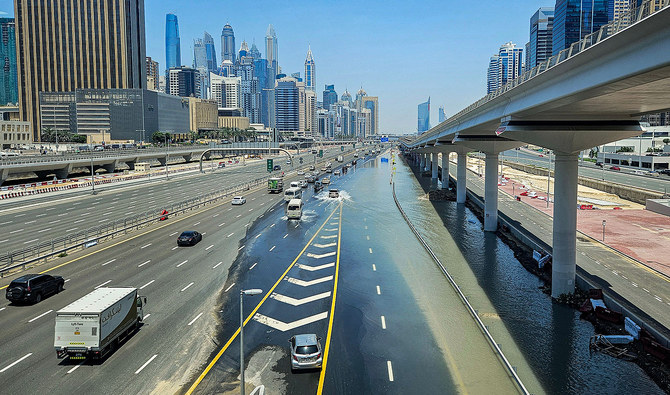
- Rains were the heaviest experienced by the United Arab Emirates in the 75 years that records have been kept
- Flooding trapped residents in traffic, offices and homes, houses’ roofs leaked and malls were overrun with water
DUBAI: Dubai, a city in the desert proud of its futuristic gloss, was on Thursday busy clearing its waterclogged roads and drying out flooded homes two days after a record storm saw a year’s rain fall in a day.
Dubai International Airport, a major travel hub, struggled to clear a backlog of flights and many roads were still flooded in the aftermath of Tuesday’s deluge.
The rains were the heaviest experienced by the United Arab Emirates in the 75 years that records have been kept. They brought much of the country to a standstill and caused significant damage.
Flooding trapped residents in traffic, offices and homes. Many reported leaks at their homes, while footage circulated on social media showed malls overrun with water pouring from roofs.
Traffic remained heavily disrupted. A highway through Dubai was reduced to a single lane in one direction, while the main road that connects Dubai with the capital Abu Dhabi was closed in the Abu Dhabi direction.
“This was like nothing else. It was like an alien invasion,” Jonathan Richards, a Dubai resident from Britain told Reuters.
“I woke up the other morning to people in kayaks with pet dogs, pet cats, suitcases all outside my house.”
Another resident, Rinku Makhecha, said the rain swamped her freshly renovated house she moved into two weeks ago.
“My entire living room is just like ... all my furniture is floating right now,” she said.
In Dubai’s streets, some vehicles, including buses, could be seen almost entirely submerged in water. Long queues formed at petrol stations.
Dubai airport had yet to resume normal operation after the storm flooded taxiways, forcing flight diversions, delays and cancelations.
Dubai Airports Chief Operating Officer Majed Al Joker told Al Arabiya TV he expected Dubai International Airport to reach 60-70 percent capacity by the end of Thursday and full operational capacity within 24 hours.
The airport struggled to get food to stranded passengers with nearby roads flooded and overcrowding limited access to those who had confirmed bookings.
RETURNING SUPPLIES
The storm, which hit neighboring Oman on Sunday, pounded the UAE on Tuesday, with 20 reported dead in Oman and one in the UAE.
While some roadways into hard-hit communities remain flooded, delivery services across Dubai, whose residents are used to ordering everything at the click of a mouse, slowly began returning to the streets.
Rains are rare in the UAE and elsewhere on the Arabian Peninsula, which is typically known for its dry desert climate. Summer air temperatures can soar above 50 degrees Celsius.
Following Tuesday’s events, questions were raised whether cloud seeding, a process that the UAE frequently conducts, could have caused the heavy rains.
But climate experts blame global warming for such extreme weather events.
Researchers anticipate that climate change will lead to heightened temperatures, increased humidity and a greater risk of flooding in parts of the Gulf region. Countries like the UAE where there is a lack of drainage infrastructure to cope with heavy rains can suffer the most.
A UAE government agency that oversees cloud seeding — a process of manipulating clouds to increase rainfall — denied conducting any such operations before the storm.
President Sheikh Mohammed bin Zayed Al Nahyan said in a statement he had ordered authorities to assess the damage and provide support to families impacted by the storm.
Dubai’s Crown Prince Sheikh Hamdan bin Rashid Al Maktoum said on X that the safety of citizens, residents and visitors was the utmost priority.
“At a meeting with government officials in Dubai, we set directives to prepare comprehensive plans in response to natural crises’ such as the unexpected current weather conditions,” he said.
Arab League chief voices Gaza fears in talks with UN official
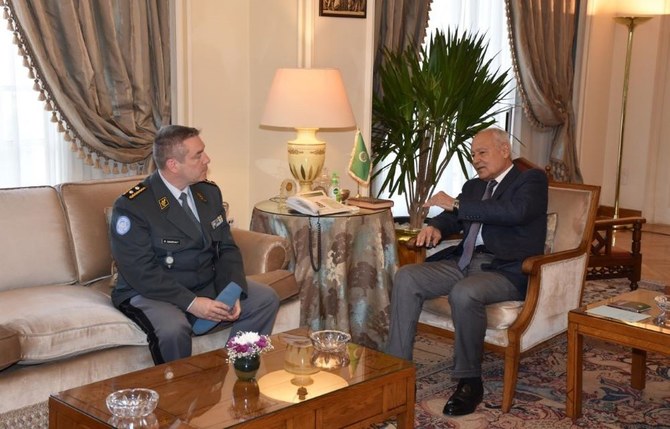
- Secretary-General Ahmed Aboul Gheit met with the UN’s Maj. Gen. Patrick Gauchat
- UNTSO chief briefed the secretary-general on conflicts in several areas monitored by the UN
CAIRO: Arab League Secretary-General Ahmed Aboul Gheit has told a senior UN official that he fears the conflict in Gaza could spiral out control and threaten regional security.
In a meeting in Cairo with Maj. Gen. Patrick Gauchat, head of mission and chief of staff of the UN Truce Supervision Organization, Aboul Gheit highlighted the need to implement the UN Security Council’s ceasefire resolution, and provide urgent humanitarian aid to the famine-stricken population in Gaza.
Gamal Roshdy, a spokesperson for the Arab League chief, said that the meeting discussed the regional situation, with Aboul Gheit saying that Israel’s war on Gaza violated international law and humanitarian principles.
The UNTSO chief briefed the secretary-general on conflicts in several areas monitored by the UN, including the Blue Line, which delineates the truce between Lebanon and Israel.
Aboul Gheit said that political resolutions remain the most effective means to ensure security for all parties.
However, achieving such resolutions remains challenging while Israel pursue its objectives through military force and by targeting civilians, he said.
According to the UNTSO website, the Security Council, in Resolution 50 (1948), called for a cessation of hostilities in Palestine on May 29, 1948, and decided that the UN Mediator should supervise the truce with the assistance of a group of military observers.
The first group of military observers, established in 1949 to supervise the implementation of the Israel-Arab Armistice Agreements, became known as the UN Truce Supervision Organization.
UNTSO observers in the Middle East to monitor ceasefires, supervise armistice agreements, prevent isolated incidents from escalating, and assist other UN peacekeeping operations in the region.



